2021 seems to be the year of vigilante heroes and antiheroes in K dramaland. Whether they be cops, consiglieres, judges or even taxi drivers, there’s a vexing feeling that all’s not that well with the world and someone needs to set things right. Going by the book doesn’t seem to be helping because the book often ends up being a tool for the wealthy and the well-connected further widening the gap between the haves and the have nots. To add insult to injury the haves can’t help but flaunt their power by their conspicuous consumption deliciously caricatured by the drama here. In this so-called Korean dystopia, only the working man and woman on the street bear the brunt of the economic costs of lawlessness perpetuated on them. Needless to say the premise is a familiar one — corruption in high places and seemingly intractable conspiracies among power holders.
Enter the devil judge aka Kang Yo-han, a charismatic if enigmatic figure who wines and dines with the high and mighty only for them to discover that he isn’t their attack dog on a leash that they had envisaged. Unfortunately for them and fortunately for those victimized by the rich bullies, he’s got another agenda. To the public he’s a charismatic champion for justice but in private, he teases cynical nothings in the ear of the confused Kim Ga-on. Televised trials are not about justice… it’s just a game, he says. A bit of fun at the expense of the elite who are largely getting away with murder. The legal system is broken so he exploits Old and New Media like a masterful politician instead to have them dancing to his populist tune. Kang Yo-han has a knack for the theatrical and presides over name and shame exposés rather than trials. As a result of his recent efforts he has the public eating out of his hand. For now. Public opinion is a fickle master and the tide can just as easily turn against him. There’s some sense of the old bread and circuses — the public are hungry for someone to stick their neck out and take the fight right to the source and as long as he keeps giving them what they want, he is hailed a hero. He’s certainly got a finger on the pulse of public sentiment and a shrewd understanding human psychology. The Lee Young-min trial is proof of that and what he’s prepared to do to make a point.
Away from public scrutiny, Yo-han dresses in street clothes and displays hoodlum tendencies. Everyone has a dark side to be sure but his happens darker than most. As a priest who knew him as a child said, Yo-han might be the devil incarnate wreaking havoc and destruction wherever he goes. I don’t doubt he has a violent side and a penchant for the dramatic but there’s something appealing about the way he’s shaking things up for those who were present the day Verena Church burnt down. Whatever else he might be, Kang Yo-han is first and foremost an actor becoming whatever he’s needed to be at any given time and place.
Who is the real Kang Yo-han? That’s the question that a very biased Ga-on attempts to get to the bottom of. He is both intrigued and repulsed by the puzzle that is Kang Yo-han. What his motives? And at the end of the day, does it really matter if he isn’t a legal purist if he gets the job done in sensational fashion? Yo-han certainly doesn’t try too hard to disabuse him of any wrong impressions he might or might not have. My own feeling is that for his agenda to work he has to be seen purely as a machiavellian creature calculating every step… one, two steps ahead of foe and friend. Is he trying to seduce the boyishly idealistic Ga-on over to the dark side or arm him to face a fate worse than death?
Clearly Yo-han is less the upholder of the South Korean constitution than he is a judge of the hearts and minds of men and women. Showcasing trials on television is nothing new of course. But turning it into a reality tv show with audience participation gives new meaning to the notion of “trial by media”. Like Liar Game before it, it is both a critique of the relentless ubiquity of media and a celebration of the freedom of expression. It’s a double-edged sword with the potential for wide scale manipulation. Yo-han however doesn’t seem interested in being the hero or any kind of good guy except in some superficial way. What motivates him is the unmasking of the power holders of the country. His goal is to strip bare their hypocrisies and watch them squirm. He makes no claim to virtue — he is only a trickster that dances on the deep-seated foibles of humanity. The school story related by the priest to Ga-on is the key to understanding Yo-han’s modus operandi. Civility or the civilizing forces of society can only go so far but a brute beast lurks under the veneer of respectability. Self-interest ensures that in a time of crisis like the church fire, it’s every man for himself. Religion as represented by the church can be a civilizing agent but when danger hits, it’s fight or flight. It’s Lord of the Flies staged and played out for public consumption.
Yo-han’s exploits thus far reminds me of an oft quoted passage in As You Like It.
All the world’s a stage,
And all the men and women merely players;
They have their exits and their entrances;
And one man in his time plays many parts,
At the end of the day no one can be sure what Yo-han really believes. Is he the misanthropist he likes Ga-on to think he is or is he in search of someone to change his mind? Sometimes I wonder if the contradictions that he manifests is nothing more than an act in search of hope. Yo-han is in essence a child of two fathers. The angry man who gave him life and the compassionate older brother Isaac who ensured that he lived. This duality plays out in the tug-of-war between his street thug persona vs his well-groomed media judge side. Chairman Kang ensured that Yo-han would be flogged into submission — the savage within would be tamed. Isaac ensured that Yo-han would be civilized with the great works of literature and learning. Crime and Punishment would be formative of his perspective on the dark shadow that lies in the heart of every man, woman and child. Conrad who wrote Heart of Darkness was also concerned with humanity’s tendency to “devolve” once its darker appetites are given free reign. Wealth and power barely function as civilizing agents but here at least give cover to the real depravity that lurks within. The Social Reform Foundation, ironically named, is illustrative of this. On the surface it seems to be a good-doing non-profit but the lecherous chairman and his personal assistant are far from being altruistically motivated. Their dysfunctional dynamic goes back a long way and is marked by all the same dark impulses seen elsewhere in the show. That’s why there’s jeering laughter in the background when he pontificates about a benevolence and compassion that he doesn’t believe in. Likewise Lee Min-young, who sets himself above the law in how he interacts with the plebs, is really a symptom not the problem.
Just as Yo-han is the son of two fathers, Ga-on might end up being the intellectual offspring of two father figures — his mentor supreme court judge, Min Jung-ho and his new boss the devil judge, Kang Yo-han. One continues to rest his faith in the rule of law and the other is a sceptic of the law’s ability to really achieve anything of worth. because the mechanism is broke. In due course it’s certain that this tug-of-war will play out for the battle of Ga-on’s soul as Yo-han unveils the system’s hidden rot apparently eroding the entire superstructure.
Perhaps what Yo-han sees in Ga-on is a lifeline. His naivete, his desire to do good and his passion to see justice done are all contrasted with his contempt for his fellow human beings. Afterall Ga-on is Isaac’s doppelganger in almost every way. It could be that Yo-han refuses to drown completely in the mire of his own cynicism and sees in Ga-on another Isaac to save him from utter despair. So between them is an ongoing conversation about the individual’s need for self-expression and the uneasy acknowledgement that self-expression has to be filtered through the troubling confines of social order.
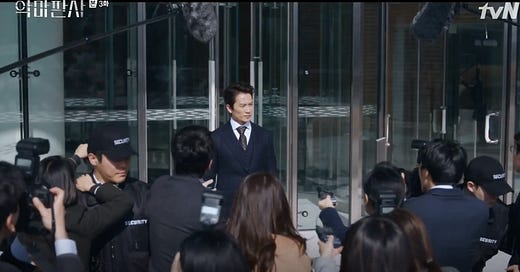




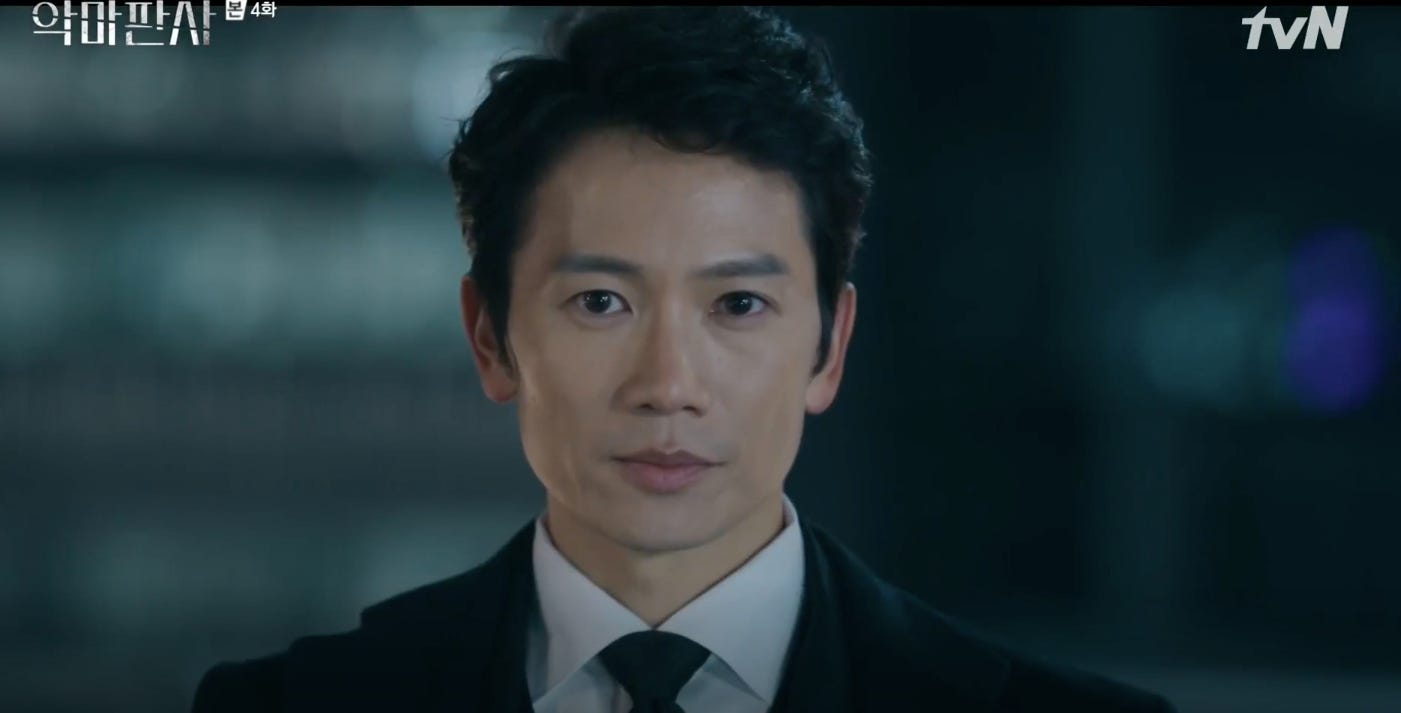
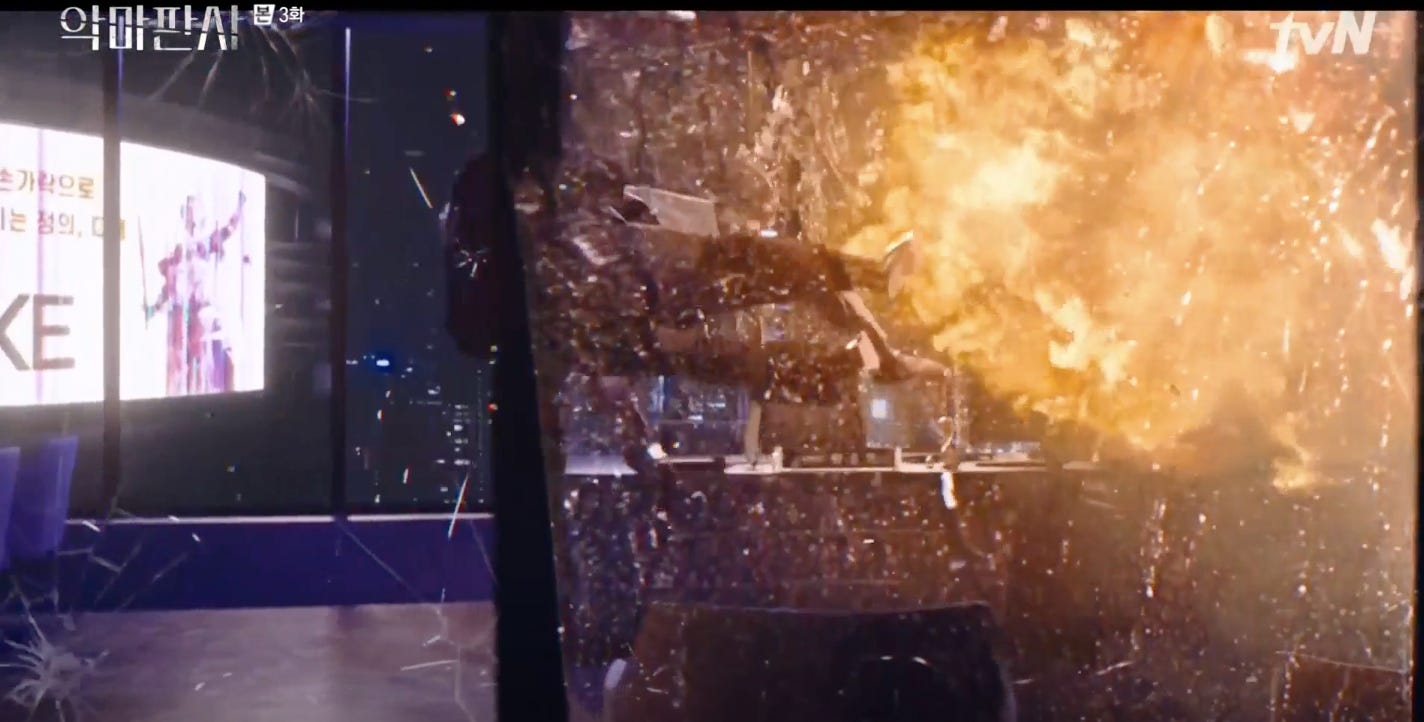

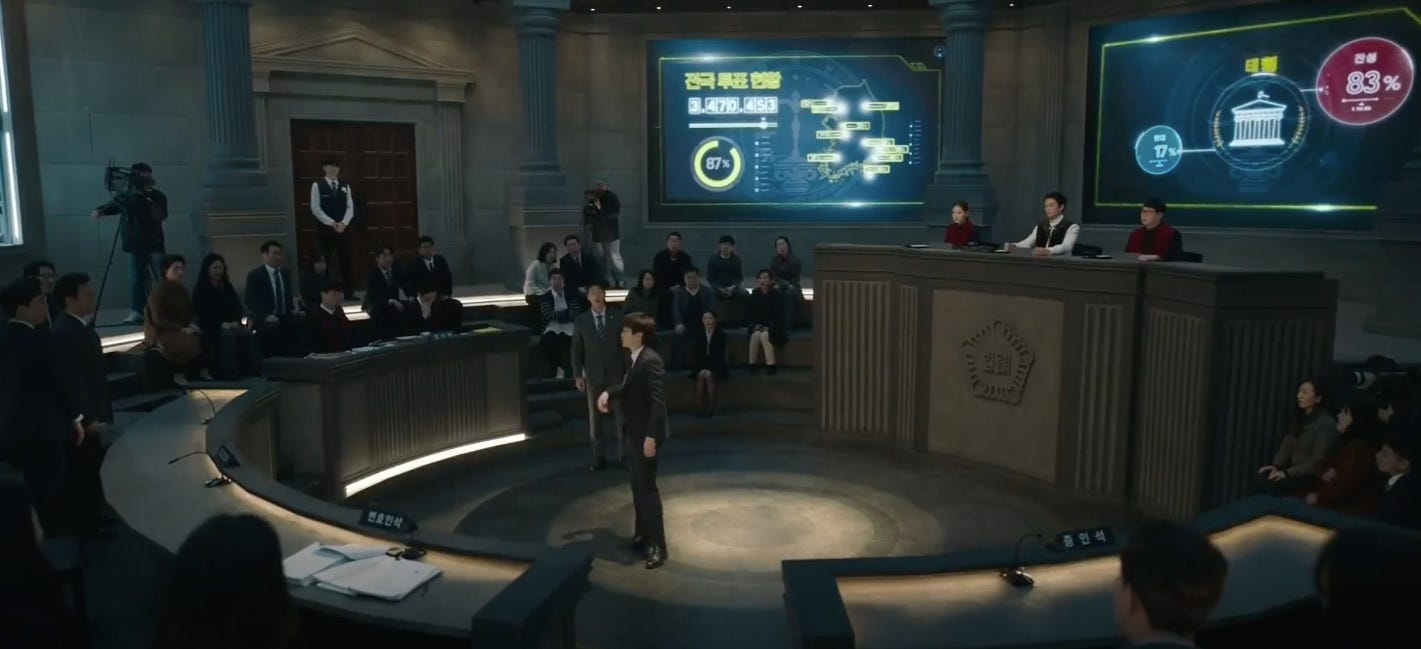
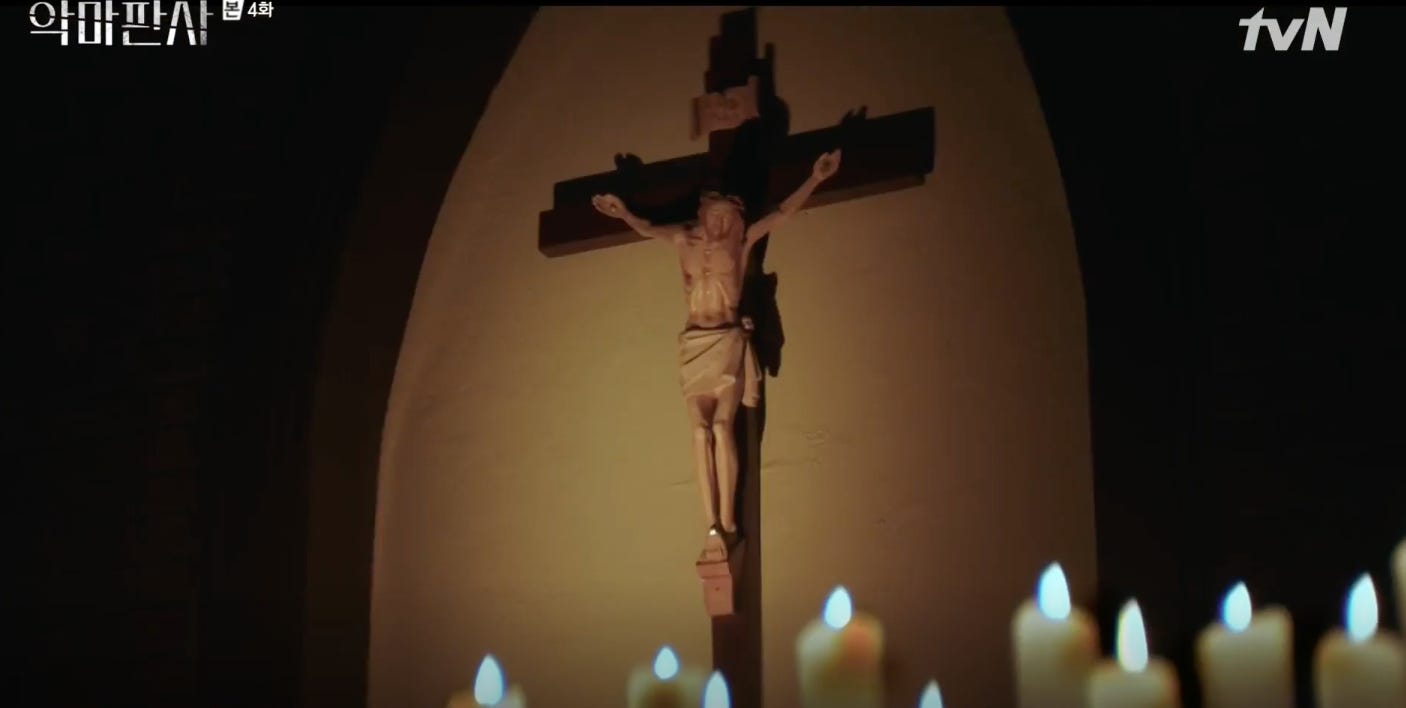
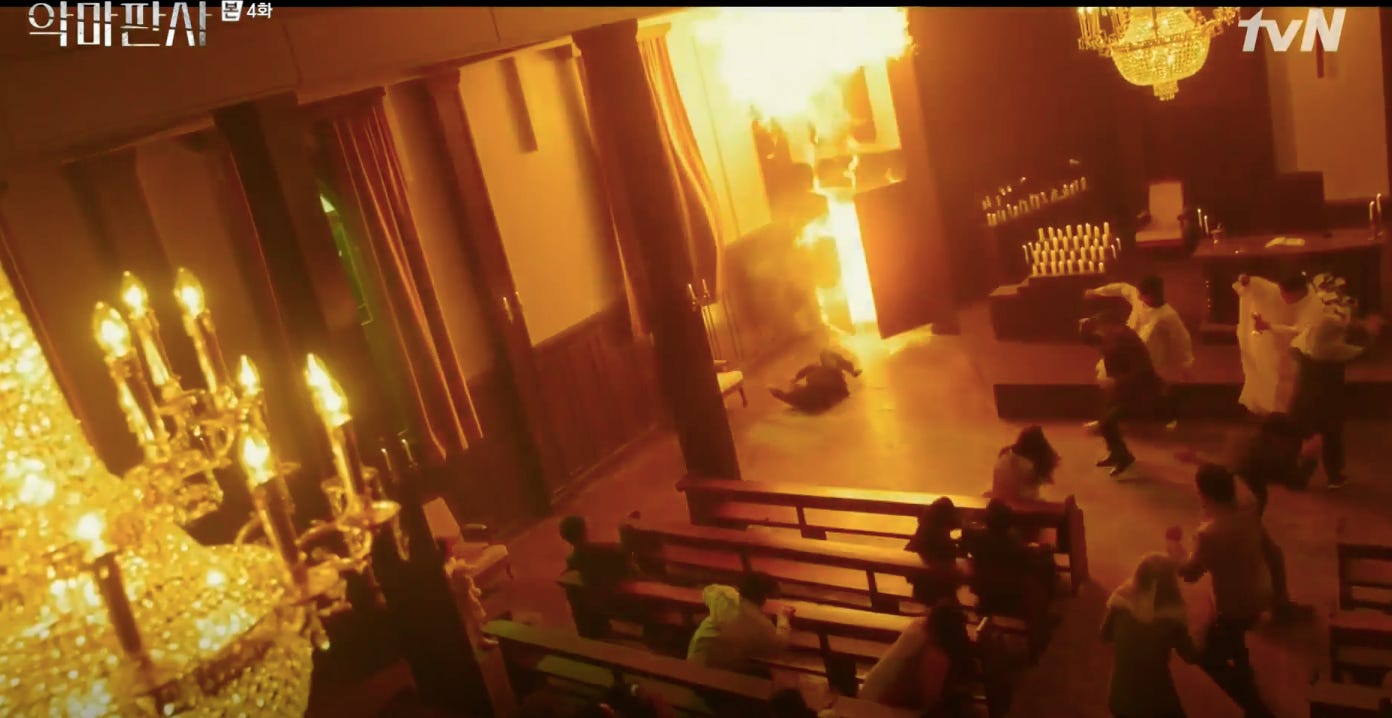
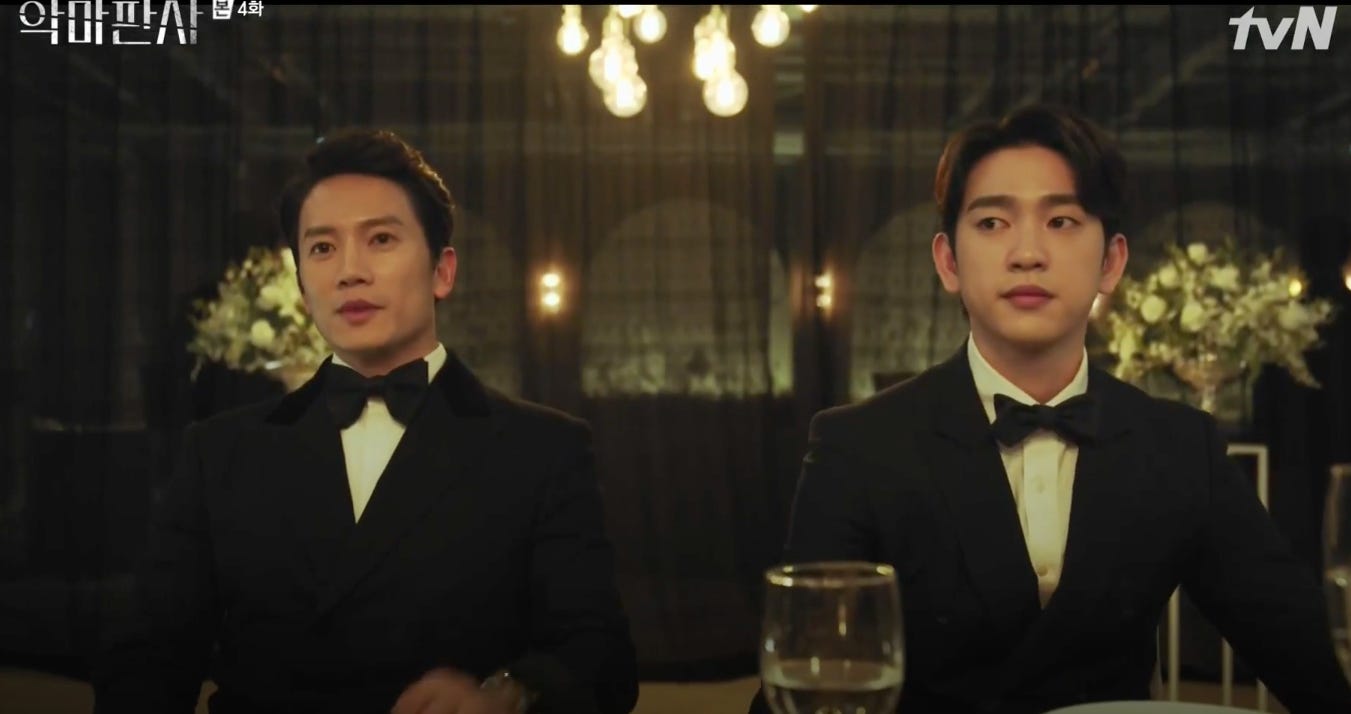
I could not get past the first episode of DJ. Though I found the dystopian premise intriguing, I found the incident of the bus crash too calculated, extreme and unbelievable with all its close calls and with the Judge (not Security) suddenly the man with a high-powered rifle (why?) in his hands to save the day. Way too over the top right out of the gate. Made me question the writer's skill and his/her confidence in the viewers willingness to believe anything the show puts forth. Surely there could have been a more intelligent and believable way to start to establish the characters of the two MLs.